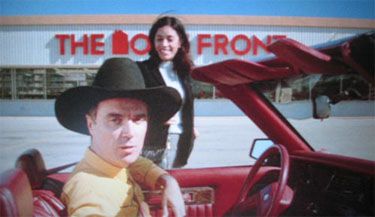Chapter Two: True Stories
By Brett Beach
December 9, 2010
This is because the film was, to my understanding and supported by the print show, shot in 1.37:1 aspect ratio, that is, barely more than the television ratio of 1.33:1. Thus, what would be a pan and scan in most other instances doesn’t suffer from being shown at “full screen.” The outdoor vistas capture the sprawl of Virgil and the push of the still-expanding town against open fields, even without widescreen. But Lachman coordinates his interiors carefully as well, particularly in the sequence set in Virgil’s main shopping mall, where the hustle and bustle going on around the narrator as he strolls the promenade doesn’t feel boxed in The primary colors also pop off the screen with an intensity that fairly reminds me of mid-1960s Godard such as Two Or Three Things I Know About Her.
With its collapse of high fashion, music videos, commercials, mall culture and small-town civic pride into a giant musical Pop Art stew, True Stories was slightly ahead of the curve in its time and still feels fresh in 2010, not entirely an ‘80s-fueled nostalgia trip. This was Goodman’s first major lead role and he has rarely been so emotionally vulnerable, self-deprecating and disarming. He is the face of Virgil and his gentle and honest demeanor sets the tone for much of what follows. Spalding Gray appears in only three scenes but one involves an economic allegory played out at the dinner table (bringing new meaning to playing with your food) that ends with his frantic enjoinder to his children, “Linda! Larry! There’s no concept of weekends anymore!” His over-ingratiating manner endeared him to my pre-teen self and Gray remained one of my favorite performers/personalities until his suicide in 2004.
To close out, I wanted to return to my theory about the nature of the narrator. Part of it is inspired by one of the scenes in the published screenplay that’s not in the movie - a funeral for one of the main characters that brings together a large chunk of the town; and part of it is from a quote in a review of the film that likened it to Our Town, Thornton Wilder’s quietly aching portrait of the beauty and sadness in day-to-day life. I think the comparison is apt, even more so if the narrator is looked at like a benign angel of death, biding his time in town, the ultimate outsider, but still on quite intimate terms with everyone. The people of Virgil are happy to be alive, even as they know, as indeed we all do, that there might be nothing coming after tomorrow.
Next time: The year ends with... 1930s German Expressionism? An estrogen-fueled romp through the Middle East? Something else entirely? I have yet to decide...
Continued:
1
2
3
4
5
|
|
|
|




